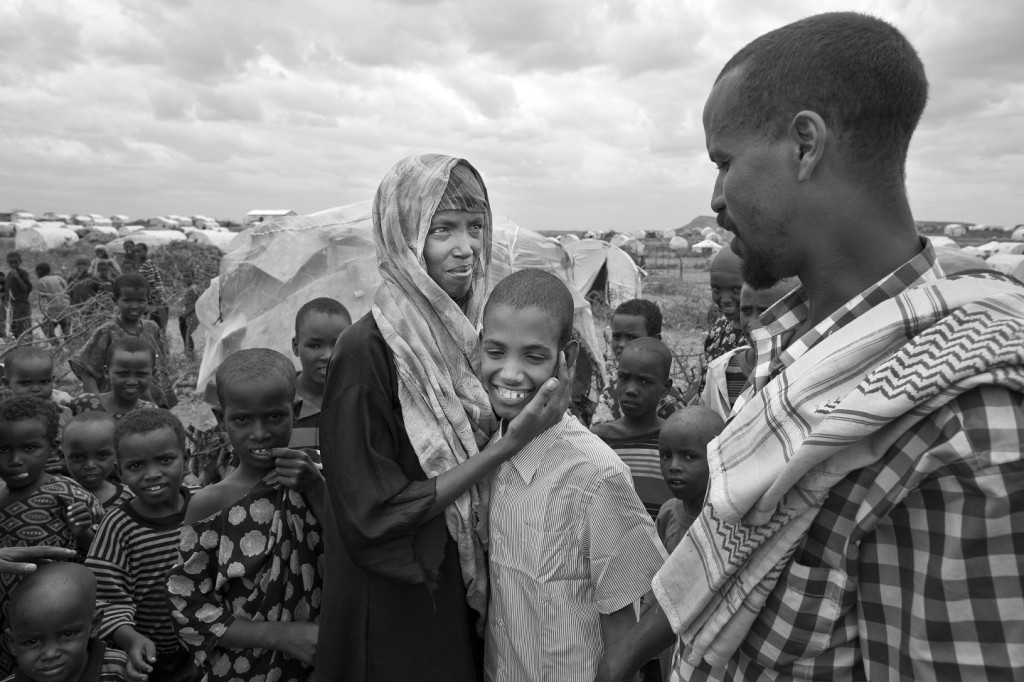Jiro Ose, Photojournalist

Photo by J. Ose/2012.
Surprised Reunion
By Jiro Ose
I walked into a classroom one late morning in January, and all the eyes followed and focused on me. Among seas of gleaming young eyes in the over-crowded classroom, one set of familiar eyes caught mine. It took a few seconds but realized that it is he. “Ah! It’s him! It’s him!” I exclaimed inside. I am terrible with names but never forget the face, especially eyes. With the total elation and excitement, I approached him and gestured to him if he recognized me. He nodded shyly with a grin.
It was June 2012 when I first met Issack in Dolo Ado, Ethiopia. He just arrived that morning, alone. All he had was cloth on his back and a small black plastic bag. His eyes cast down filled with anxiety and exhaustion from his long journey. He left his family in the Bay region of Somalia and decided to come to Dolo Ado, making the treacherous journey all alone because he wanted to go to school. He only attended one month of school the year before because of school closure due to insecurity and drought in the region. I spent that morning following him until he was united with his relatives. When he was in the arms of his aunt, he finally smiled, giving a sigh of relief.
Nearly 2 years on, now he grew a few centimetres taller and so did his hair. I shook his hand and spoke to him in English if he remembered me. “Yes” he replied. The high level delegation I was following that day is moving onto the next location. I shot a few frames of him and took his contact info and hurried out the classroom, promising him that I would visit him soon.
Looking at the familiar scenery of the camp from a moving car kicking up the cloud of sand, my elation of finding Issack was slowly damped by the realization of the hard fact. “He is still here.” He is not with his family, and won’t be for a long time. A collection of camps near Dolo Ado, near the border with southern region of Somalia grew over 200,000 now. I visited Dolo Ado several times starting in August 2011 in the midst of emergency. It was soon after the UN declared the famine in southern region of Somalia. In Kobe camp, where I found Issack, 10 children were dying each day from malnutrition. Everyone was scrambling to save lives as thousands cross the border every day. A stark difference from the Japanese port city known for over- priced and praised beef, next to where I grew up, Osaka. Each time I visited the camps, the situation has improved. Malnutrition and mortality rate has plummeted. Better shelters were erected, and water and sanitation was improved. For my last trip, part of my assignment was to photograph newly erected solar powered street lamps.
I am glad that Issack is away from harm and getting education. But if I think of his future, this heavy feeling weighs me down. There is a slight improvement in the situation in his homeland but no one knows if it will continue. The vast majority of people I have spoken to said that they did not feel it is safe enough to return, and for a long time if ever. Ethiopia most generously hosts refugees coming from all directions, but even Issack and many others get education and skills, its encampment policy does not allow Somali refugees to live outside the camps and work. This March, I was visiting much older camps outside Jijiga, Ethiopia. Some Somali refugees have been there since the nation collapsed and descended to chaos in early 90s, and some children there were born and practically grew up there. I was there to document a special education program for girls. Extremely bright students in equally bright hijabs announced in near perfect English, “I want to be a doctor!” “I want to be an engineer!” “I want to be a teacher because…..” I was amazed by their strength and determination despite the adversity and uncertainty they face. This sounds such a cliché but, looking into eyes of Issak and those girls, I feel extremely fortunate, happen to be born in a rich and stable country. How unfair the life is. I do believe that my work allows me to show that hard fact, and hopefully contribute to improve their situation, however small.

Photo by J. Ose/2012.
Jiro Ose
Photojournalist
Born in Osaka, Japan, Ose has worked as a photojournalist at several daily newspapers before turning freelance in 2005. He has covered various events worldwide such as the historical election in Congo, Sudanese refugee crisis, departure of deposed president Jean-Bertrand Aristide in Haiti, Iraq War and others.










